外研版七年级英语下册:Module 4 Life in the future Unit1-课件2
文档属性
| 名称 | 外研版七年级英语下册:Module 4 Life in the future Unit1-课件2 |  | |
| 格式 | zip | ||
| 文件大小 | 813.0KB | ||
| 资源类型 | 教案 | ||
| 版本资源 | 外研版 | ||
| 科目 | 英语 | ||
| 更新时间 | 2013-12-14 17:34:32 | ||
图片预览

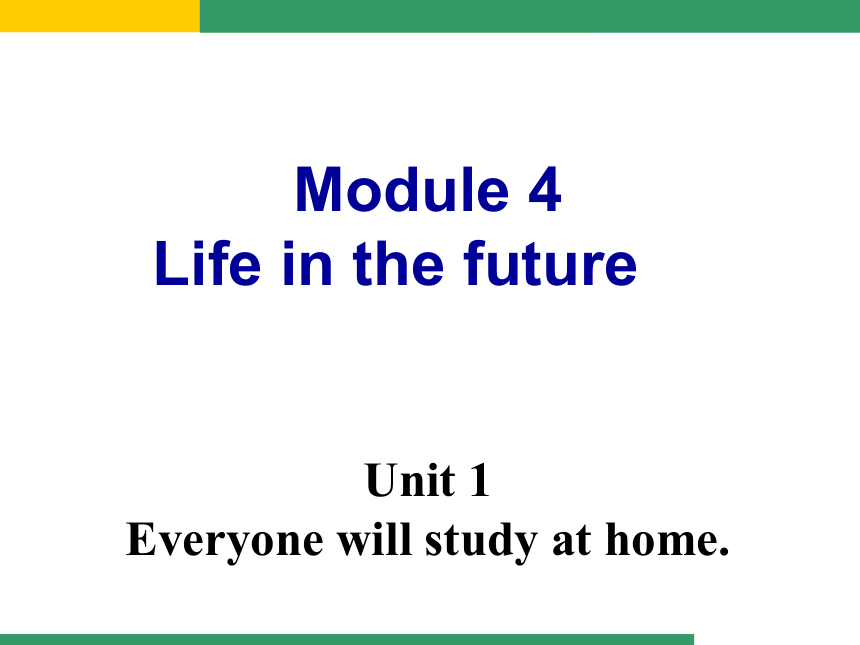
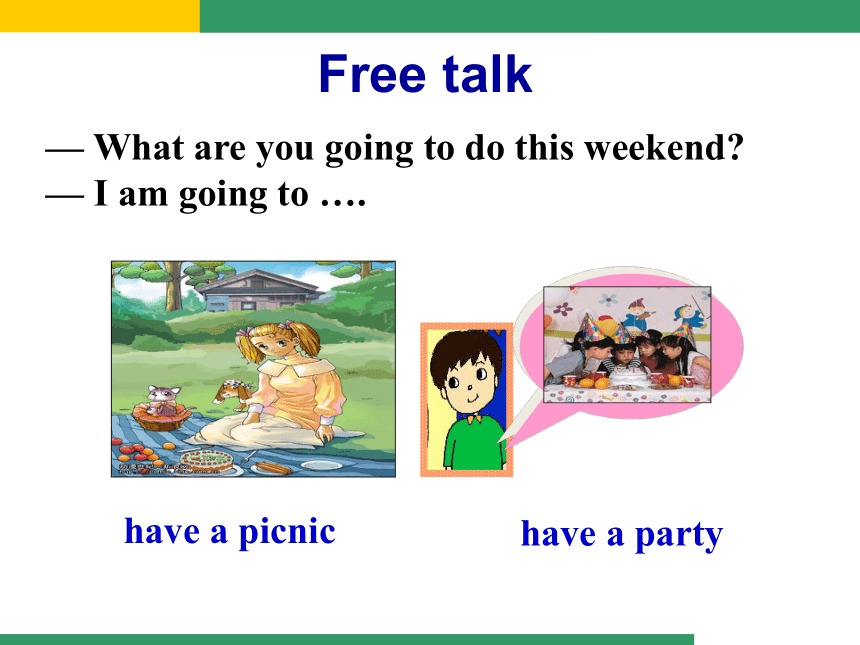
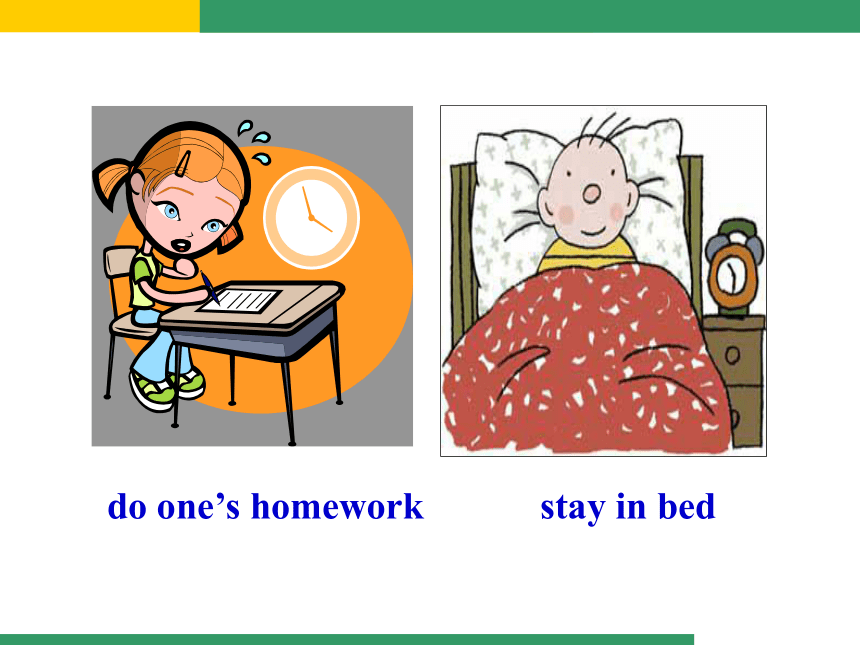
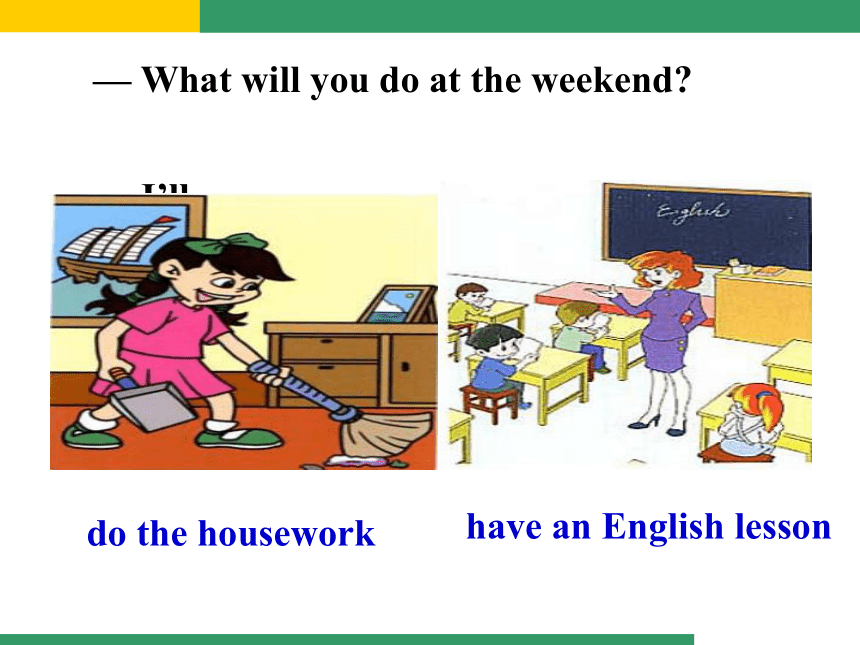
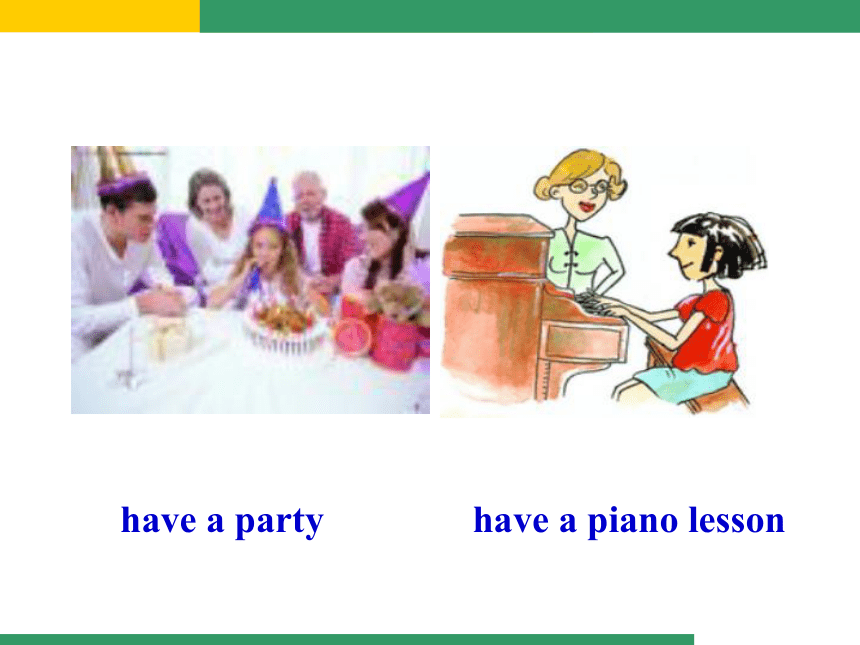
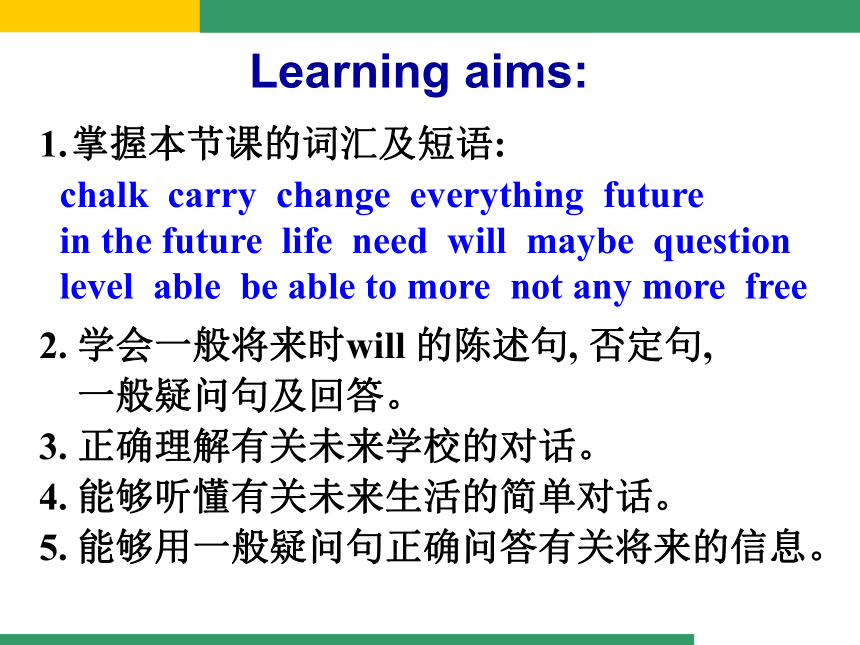

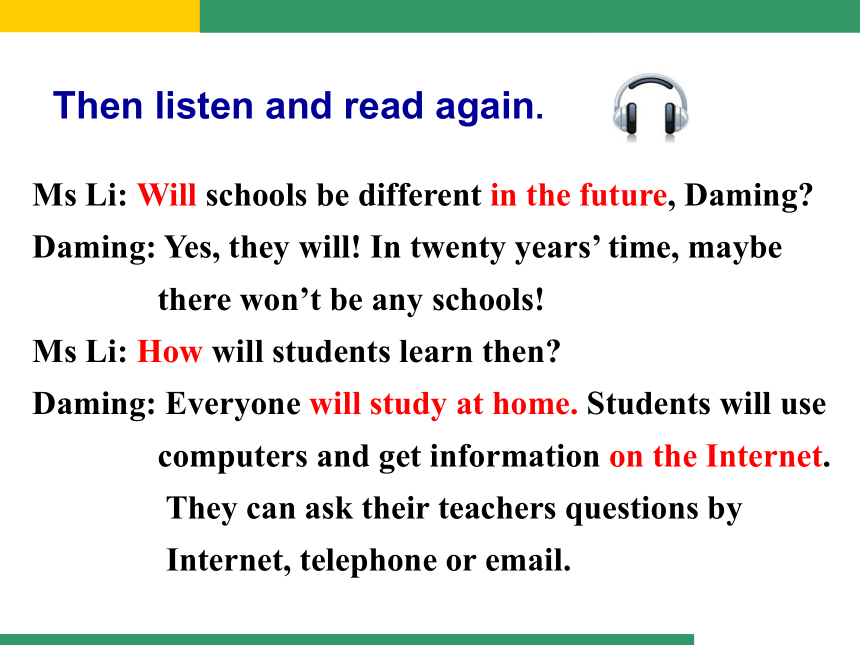
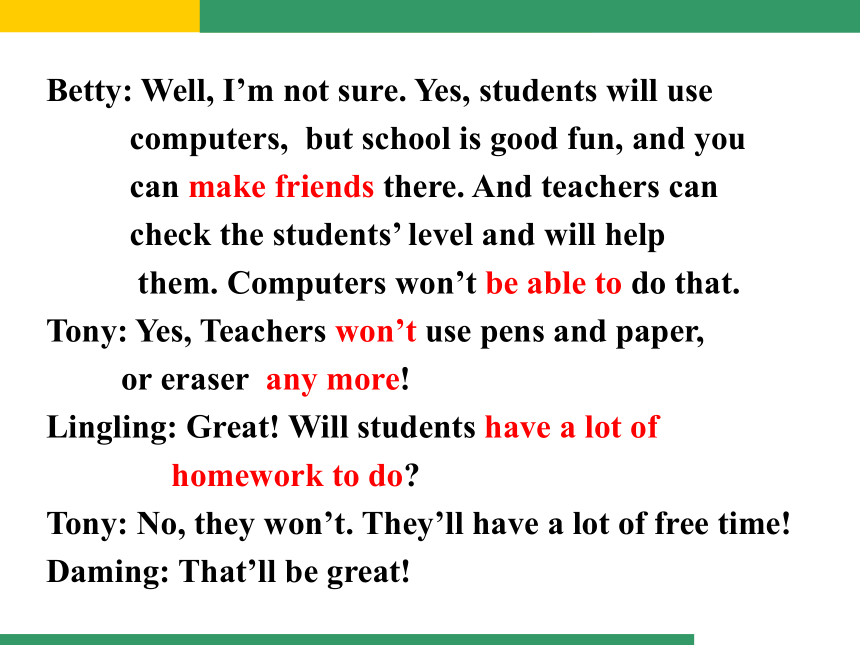
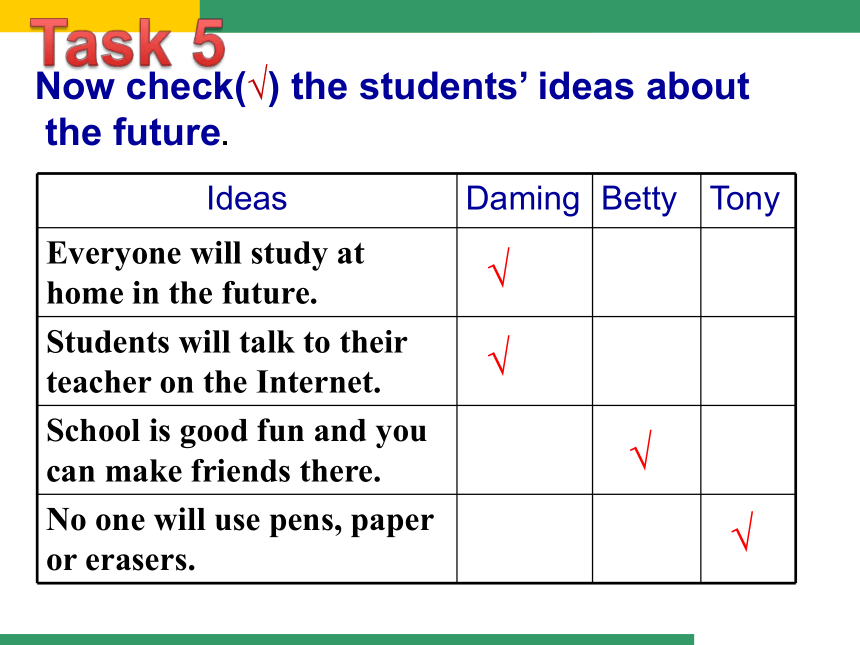

文档简介
课件37张PPT。七年级下册Module 4
Life in the future学科网
Unit 1
Everyone will study at home.— What are you going to do this weekend?
— I am going to ….组卷网
Free talkhave a picnichave a partydo one’s homeworkstay in bed— What will you do at the weekend?学组卷网
科网
— I’ll …do the houseworkhave an English lessonhave a partyhave a piano lessonLearning aims:掌握本节课的词汇及短语:
2. 学会一般将来时will 的陈述句, 否定句,
一般疑问句及回答。
3. 正确理解有关未来学校的对话。
4. 能够听懂有关未来生活的简单对话。
5. 能够用一般疑问句正确问答有关将来的信息。chalk carry change everything future
in the future life need will maybe question level able be able to more not any more free
3. Watch and readEveryday EnglishWell , I’m not sure.
That’ll be great!Task 4Then listen and read again.Ms Li: Will schools be different in the future, Daming?
Daming: Yes, they will! In twenty years’ time, maybe
there won’t be any schools!
Ms Li: How will students learn then?
Daming: Everyone will study at home. Students will use
computers and get information on the Internet.
They can ask their teachers questions by
Internet, telephone or email.Betty: Well, I’m not sure. Yes, students will use
computers, but school is good fun, and you
can make friends there. And teachers can
check the students’ level and will help
them. Computers won’t be able to do that.
Tony: Yes, Teachers won’t use pens and paper,
or eraser any more!
Lingling: Great! Will students have a lot of
homework to do?
Tony: No, they won’t. They’ll have a lot of free time!
Daming: That’ll be great!Now check(√) the students’ ideas about
the future.√√√√Task 51. carry 搬运
【辨析】bring、take、carry
(1) bring意为“带来”,指把某物从别的地方带到说话时的这个地方来。如:
Remember to bring your book tomorrow.
记住明天把你的书带来。
(2) take意为“带走”,把某物带到别的地方去。
It’s going to rain. You’d better take an umbrella with you.
要下雨了。你最好带上一把雨伞。
Language pointsTask 6(3) carry一般指“随身携带的细小物品”,此外还多用于汽车、火车等交通工具
意为“运载”的意思。如:
He always carries a pocket dictionary with him.
他总是随身携带一本袖珍字典。
The bus carried me to the park yesterday.
昨天公共汽车把我拉到了公园。
2. Maybe there won’t be any school!
maybe 也许
【辨析】 maybe may be
(1) maybe 是副词,“也许”,相当于perhaps。
maybe只能放于句首,不能放于句中,如:
Maybe he won’t come. 也许他不会来。
(2) may be 是谓语形式,其中may是情态动词,be是连系动词,表示“也许是”、“可能会有”等。如:
He may be a middle school student.
他可能是个中学生。
She may be watching TV now.现在她也许在看电视。
there won’t be = there will not be
这是there be结构的一般将来时的否定形式, 肯定结构
为: there will be.当然there be结构的将来时结构也可
以用there is going to be 或there are going to be. 如:
1) There will be a football match on TV tomorrow.
= There is going to be a football match on TV
tomorrow.
2) There will be some schools in the future.
= There are going to be some schools in the future. 3. Well , I’m not sure.
be sure 确信, 一定
be sure 后可跟不定式或从句, 句意也不相同。
如: 1) I am sure to go to Beijing tomorrow.
= I am sure that I will go to Beijing tomorrow.
我明天一定会去北京。
2) He is sure to visit the Great Wall next week.
= He is sure that he will visit the Great Wall
next week. 他下周一定会去参观长城。
3) I am sure he will fly to America in a few days.
我相信几天后他将乘飞机去美国。4. Computer won’t be able to do that.
be able to …能够做…
be able to 与can用法与区别:
be able to 强调通过努力而获得的能力,而can则强调自身
已具有的能力。
如:She can sing the song in English.
她能用英语唱这首歌。
He will be able to sing this song in English in a few minutes, too.几小时之后,他也能用英语唱这首歌。
(2) be able to 强调一种结果,而can只强调一种可能。如:Luckily, he was able to escape from the big fire in the end.
幸运的是,他终于逃出了大火。
If he got here a few hours earlier, I could save him.
要是他早几小时来,我还能救他。
(3) be able to 可以有各种时态;而can只有一般现在和一般过去两种时态。如:
I could help you last night, but you didn’t come. 昨天晚上我能帮你,而你又没来。
Can you see it there? 你能看见它在那儿吗?
He is / was / will be able to help you. 他能帮你的忙.
(4) can可用于表示可能性,推测,允许等情况,而be able to通常不这样用。
5. not…any more 不再
= no more侧重程度和数量,比如: You can drink no more.
= You can't drink any more. 你不能再喝了
not any longer
= no longer重时间,比如:
He no longer lives here.
= He doesn't live here any longer.
4. Complete the passageable any more free level
maybe need question telephoneBetty: We’ll always (1)_______ teachers because computers will never be (2)_______to check the students’(3)________ and answer their (4)________ by (5)__________ or Internet. Will students need to go to school (6)__________? Yes, (7) ________ they will, because school is good fun, but everyone will have lots of (8)_______ time.needablelevelquestionstelephoneany moremaybefreeTask 65. Listen and mark the stress.blackboard
computer
eraser
Internet
telephoneNow listen and repeat.Task 76. Listen and repeat./ j u: / future student
/ ? / but fun study us
/ u: / ruler
/ ? / put7. Work in pairs. Ask and answer the
questions.
1. Will schools be different in the future?
2. Will students use books in the future?8 Work in pairs. Talk about what your school will
be like in ten years.We will study at home and only go to school
for sports and games.Will, this is good, but I’ll miss my teacher
and friends. 一般将来时表示将来某一时刻的动作或状态,
或将来某一段时间内经常的动作或状态。(Simple Future Tense )一般将来时一般将来时的主要用法:1、表示将来某一时刻的动作或状态:
We shall(will) come to see you the day after tomorrow.
There will be a wonderful show next week.
2、表示将来某一段时间内经常的动作或状态:
The students will come and work in the lab once a week.
we shall come and work in this factory every year.
一般将来时的基本结构:
be (am, is, are)going to+动词原形 (复习)
will /shall(第一人称)+动词原形
常见的时间状语:next Tuesday
next week
the coming Sunday
next year
this afternoon
tomorrow
tonight
in a few minutes
in the future
in five years一般将来时的构成 一般将来时表示将来发生的动作或存在的状态 助动词shall/will + 动词原形(当主语第一人称时,一般用shall,shall用于第一人称,常被will 所代替。)
?
肯定式: 主语+shall/will+动词原形+其他 否定式: 主语+shall/will+not+动词原形+其他.
疑问式: Shall/Will+主语+动词原形+其他
简略回答: (肯) Yes,主语+shall/will .
(否) No,主语+shall/will+not …
?
肯定式: 主语+shall/will+动词原形+其他
否定式: 主语+shall/will+not+动词原形+其他.notnot缩写形式: 'll ==shall/will he will= he’ll
shan't== shall not won't == will not 疑问式: Shall/Will+主语+动词原形+其他----- Will they go there to study English?
----- Yes, they will.
----- No, they will not.表示说话人征求对方的意见Will you pass me that cup?
Will you (please) help me with maths?
Will you please lend me your pen? Shall we have a drink? Shall I open the window? Where shall we have the meeting? will 在陈述句中用于各人称,在争求意见时或示说话人向对方提出请求常用于第二人称。 特殊疑问句一般将来时的特殊疑问句是将疑问词放在句首,后接一般疑问句.(就主语提问时,以疑问词 who 开头的疑问句除外.)-- Why will you be here on Sunday?
--I’ll have a meeting on Sunday. 对特殊疑问句要进行具体回答。There ________ a dolphin show in the zoo tomorrow evening. ? A. was??? B. is going to have
C. will have??? D. is going to be
2. –________ you ________ free tomorrow?
– No. I ________ free the day after tomorrow.
Are; going to; will??? B. Are; going to be; will
C. Are; going to; will be???D. Are; going to be; will be 一、选择DDMother ________ me a nice present on my next birthday. ????A. will gives??? B. will give ?????
C. gives??? D. give
4. – Shall I buy a cup of tea for you?
–________. (不,不要。)
??? A. No, you won’t??? B. No, you aren’t.
C. No, please don’t??? D. No, please.
BA二、按要求改写下列句子。I will use a computer to send my homework.
(改为一般疑问句)
2. He will check his emails this afternoon.
(改为否定句)
Will you use a computer to send your homework? He won’t check his emails this afternoon. 3. They will have a party tomorrow evening.
(对划线部分提问)
4. Li Ming and his friends will have a piano
lesson. (改为一般疑问句)What will they do tomorrow evening? Will Li Ming and his friends have a piano lesson? Good bye!
Life in the future学科网
Unit 1
Everyone will study at home.— What are you going to do this weekend?
— I am going to ….组卷网
Free talkhave a picnichave a partydo one’s homeworkstay in bed— What will you do at the weekend?学组卷网
科网
— I’ll …do the houseworkhave an English lessonhave a partyhave a piano lessonLearning aims:掌握本节课的词汇及短语:
2. 学会一般将来时will 的陈述句, 否定句,
一般疑问句及回答。
3. 正确理解有关未来学校的对话。
4. 能够听懂有关未来生活的简单对话。
5. 能够用一般疑问句正确问答有关将来的信息。chalk carry change everything future
in the future life need will maybe question level able be able to more not any more free
3. Watch and readEveryday EnglishWell , I’m not sure.
That’ll be great!Task 4Then listen and read again.Ms Li: Will schools be different in the future, Daming?
Daming: Yes, they will! In twenty years’ time, maybe
there won’t be any schools!
Ms Li: How will students learn then?
Daming: Everyone will study at home. Students will use
computers and get information on the Internet.
They can ask their teachers questions by
Internet, telephone or email.Betty: Well, I’m not sure. Yes, students will use
computers, but school is good fun, and you
can make friends there. And teachers can
check the students’ level and will help
them. Computers won’t be able to do that.
Tony: Yes, Teachers won’t use pens and paper,
or eraser any more!
Lingling: Great! Will students have a lot of
homework to do?
Tony: No, they won’t. They’ll have a lot of free time!
Daming: That’ll be great!Now check(√) the students’ ideas about
the future.√√√√Task 51. carry 搬运
【辨析】bring、take、carry
(1) bring意为“带来”,指把某物从别的地方带到说话时的这个地方来。如:
Remember to bring your book tomorrow.
记住明天把你的书带来。
(2) take意为“带走”,把某物带到别的地方去。
It’s going to rain. You’d better take an umbrella with you.
要下雨了。你最好带上一把雨伞。
Language pointsTask 6(3) carry一般指“随身携带的细小物品”,此外还多用于汽车、火车等交通工具
意为“运载”的意思。如:
He always carries a pocket dictionary with him.
他总是随身携带一本袖珍字典。
The bus carried me to the park yesterday.
昨天公共汽车把我拉到了公园。
2. Maybe there won’t be any school!
maybe 也许
【辨析】 maybe may be
(1) maybe 是副词,“也许”,相当于perhaps。
maybe只能放于句首,不能放于句中,如:
Maybe he won’t come. 也许他不会来。
(2) may be 是谓语形式,其中may是情态动词,be是连系动词,表示“也许是”、“可能会有”等。如:
He may be a middle school student.
他可能是个中学生。
She may be watching TV now.现在她也许在看电视。
there won’t be = there will not be
这是there be结构的一般将来时的否定形式, 肯定结构
为: there will be.当然there be结构的将来时结构也可
以用there is going to be 或there are going to be. 如:
1) There will be a football match on TV tomorrow.
= There is going to be a football match on TV
tomorrow.
2) There will be some schools in the future.
= There are going to be some schools in the future. 3. Well , I’m not sure.
be sure 确信, 一定
be sure 后可跟不定式或从句, 句意也不相同。
如: 1) I am sure to go to Beijing tomorrow.
= I am sure that I will go to Beijing tomorrow.
我明天一定会去北京。
2) He is sure to visit the Great Wall next week.
= He is sure that he will visit the Great Wall
next week. 他下周一定会去参观长城。
3) I am sure he will fly to America in a few days.
我相信几天后他将乘飞机去美国。4. Computer won’t be able to do that.
be able to …能够做…
be able to 与can用法与区别:
be able to 强调通过努力而获得的能力,而can则强调自身
已具有的能力。
如:She can sing the song in English.
她能用英语唱这首歌。
He will be able to sing this song in English in a few minutes, too.几小时之后,他也能用英语唱这首歌。
(2) be able to 强调一种结果,而can只强调一种可能。如:Luckily, he was able to escape from the big fire in the end.
幸运的是,他终于逃出了大火。
If he got here a few hours earlier, I could save him.
要是他早几小时来,我还能救他。
(3) be able to 可以有各种时态;而can只有一般现在和一般过去两种时态。如:
I could help you last night, but you didn’t come. 昨天晚上我能帮你,而你又没来。
Can you see it there? 你能看见它在那儿吗?
He is / was / will be able to help you. 他能帮你的忙.
(4) can可用于表示可能性,推测,允许等情况,而be able to通常不这样用。
5. not…any more 不再
= no more侧重程度和数量,比如: You can drink no more.
= You can't drink any more. 你不能再喝了
not any longer
= no longer重时间,比如:
He no longer lives here.
= He doesn't live here any longer.
4. Complete the passageable any more free level
maybe need question telephoneBetty: We’ll always (1)_______ teachers because computers will never be (2)_______to check the students’(3)________ and answer their (4)________ by (5)__________ or Internet. Will students need to go to school (6)__________? Yes, (7) ________ they will, because school is good fun, but everyone will have lots of (8)_______ time.needablelevelquestionstelephoneany moremaybefreeTask 65. Listen and mark the stress.blackboard
computer
eraser
Internet
telephoneNow listen and repeat.Task 76. Listen and repeat./ j u: / future student
/ ? / but fun study us
/ u: / ruler
/ ? / put7. Work in pairs. Ask and answer the
questions.
1. Will schools be different in the future?
2. Will students use books in the future?8 Work in pairs. Talk about what your school will
be like in ten years.We will study at home and only go to school
for sports and games.Will, this is good, but I’ll miss my teacher
and friends. 一般将来时表示将来某一时刻的动作或状态,
或将来某一段时间内经常的动作或状态。(Simple Future Tense )一般将来时一般将来时的主要用法:1、表示将来某一时刻的动作或状态:
We shall(will) come to see you the day after tomorrow.
There will be a wonderful show next week.
2、表示将来某一段时间内经常的动作或状态:
The students will come and work in the lab once a week.
we shall come and work in this factory every year.
一般将来时的基本结构:
be (am, is, are)going to+动词原形 (复习)
will /shall(第一人称)+动词原形
常见的时间状语:next Tuesday
next week
the coming Sunday
next year
this afternoon
tomorrow
tonight
in a few minutes
in the future
in five years一般将来时的构成 一般将来时表示将来发生的动作或存在的状态 助动词shall/will + 动词原形(当主语第一人称时,一般用shall,shall用于第一人称,常被will 所代替。)
?
肯定式: 主语+shall/will+动词原形+其他 否定式: 主语+shall/will+not+动词原形+其他.
疑问式: Shall/Will+主语+动词原形+其他
简略回答: (肯) Yes,主语+shall/will .
(否) No,主语+shall/will+not …
?
肯定式: 主语+shall/will+动词原形+其他
否定式: 主语+shall/will+not+动词原形+其他.notnot缩写形式: 'll ==shall/will he will= he’ll
shan't== shall not won't == will not 疑问式: Shall/Will+主语+动词原形+其他----- Will they go there to study English?
----- Yes, they will.
----- No, they will not.表示说话人征求对方的意见Will you pass me that cup?
Will you (please) help me with maths?
Will you please lend me your pen? Shall we have a drink? Shall I open the window? Where shall we have the meeting? will 在陈述句中用于各人称,在争求意见时或示说话人向对方提出请求常用于第二人称。 特殊疑问句一般将来时的特殊疑问句是将疑问词放在句首,后接一般疑问句.(就主语提问时,以疑问词 who 开头的疑问句除外.)-- Why will you be here on Sunday?
--I’ll have a meeting on Sunday. 对特殊疑问句要进行具体回答。There ________ a dolphin show in the zoo tomorrow evening. ? A. was??? B. is going to have
C. will have??? D. is going to be
2. –________ you ________ free tomorrow?
– No. I ________ free the day after tomorrow.
Are; going to; will??? B. Are; going to be; will
C. Are; going to; will be???D. Are; going to be; will be 一、选择DDMother ________ me a nice present on my next birthday. ????A. will gives??? B. will give ?????
C. gives??? D. give
4. – Shall I buy a cup of tea for you?
–________. (不,不要。)
??? A. No, you won’t??? B. No, you aren’t.
C. No, please don’t??? D. No, please.
BA二、按要求改写下列句子。I will use a computer to send my homework.
(改为一般疑问句)
2. He will check his emails this afternoon.
(改为否定句)
Will you use a computer to send your homework? He won’t check his emails this afternoon. 3. They will have a party tomorrow evening.
(对划线部分提问)
4. Li Ming and his friends will have a piano
lesson. (改为一般疑问句)What will they do tomorrow evening? Will Li Ming and his friends have a piano lesson? Good bye!
同课章节目录
- Module 1 Lost and found
- Unit 1 Whose bag is this?
- Unit 2 Are they yours?
- Unit 3 Language in use
- Module 2 What can you do ?
- Unit 1 I can play the piano
- Unit 2 I can run really fast
- Unit 3 Language in use
- Module 3 Making plans
- Unit 1 What are you going to do at the weekends?
- Unit 2 We're going to cheer the players.
- Unit 3 Language in use
- Module 4 Life in the future
- Unit 1 Everyone will study at home
- Unit 2 Every family will have a small plane.
- Unit 3 Language in use
- Module 5 Shopping
- Unit 1 What can I do for you?
- Unit 2 You can buy everything on the Internet
- Unit 3 Language in use
- Module 6 Around town
- Unit 1 Could you tell me how to get to the Nationa
- Unit 2 The London Eye is on your right.
- Unit 3 Language in use
- Revision module A
- Module 7 My past life
- Unit 1 I was born in a small village.
- Unit 2 I was born in Quincy.
- Unit 3 Language in use
- Module 8 Story time
- Unit 1 Once upon a time….
- Unit 2 Goldilocks hurried out of the house.
- Unit 3 Language in use
- Module 9 Life history
- Unit 1 He left school and began work at the age of
- Unit 2 He decided to be an actor.
- Unit 3 Language in use
- Module 10 A holiday journey
- Unit 1 What did you do?
- Unit 2 This morning we took a walk.
- Unit 3 Language in use
- Module 11 Body language
- Unit 1 They touch noses!
- Unit 2 Here are some ways to welcome them.
- Unit 3 Language in use
- Module 12 Western music
- Unit 1 It's so beautiful!
- Unit 2 Vienna is the centre of European classical
- Unit 3 Language in use
- Revision module B
